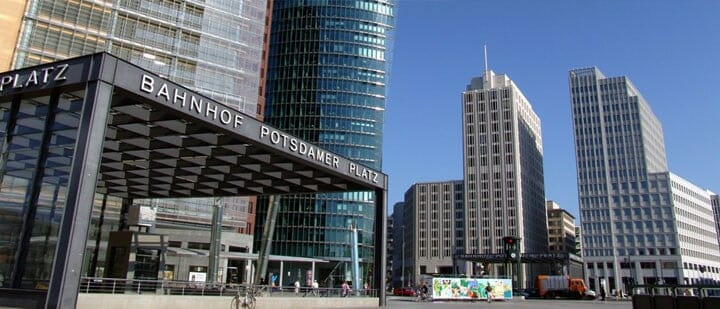
Potsdamer Platz in Berlin is on the market for $1.6 billion.
Two of China’s biggest international real estate investors are said to be facing off in a contest to acquire an 18 building commercial strip in downtown Berlin that has been put on the market for 1.5 billion euros ($1.6 billion).
Shanghai’s Fosun International and state-owned giant Ping An Insurance have both been holding separate talks to purchase the 500,000 square metre (5.4 million square foot) Potsdamer Platz development from Swedish financial group, SEB AB, according to a report in Bloomberg.
The bidding battle pits two of China’s biggest international property investors against each other in what some analysts say could be one of the next frontiers for Chinese real estate deals.
Buying Daimler’s Berlin Home
The property that Fosun and Ping An are fighting for is a landmark mixed-use development near the former site of the Brandenburg Gate in the wall that once divided the German city.
The project, which consists of 42 percent office space and 22 percent retail, also includes apartments and hotels. The Potsdamer Platz complex was developed starting in 1991 as part of a plan for a unified Berlin and SEB AB bought the 19 building complex from Daimler in early 2008 for a reported 1.4 billion euros.
Potsdamer Platz is still home to Daimler, as well as to the offices of PricewaterhouseCoopers. SEB is being assisted in marketing the complex by real estate services firm Eastdil Secured, and is said to be asking 1.5 billion euros ($1.6 billion). The Potsdamer Platz portfolio is held by SEB Asset Management’s ImmoInvest fund, which needs to be dissolved within just over two years time.
Two Real Estate Heavyweights Face Off

Fosun’s Guo Guangchang, who acquired Club Med this year, is no stranger to bidding wars.
Both Ping An and Fosun have already made multiple deals for international real estate assets, although this would be the first property deal for either of them in Germany.
Ping An has already made two major acquisitions in London, having first picked up the Lloyd’s of London building in London for ₤260 million ($390 million) in July 2013, and then acquiring Tower Place in the UK capital for ₤327 million ($490 million) earlier this year.
Fosun has been very active internationally as well; the investment conglomerate controlled by Chinese billionaire Guo Guangchang first acquired One Chase Manhattan Plaza in New York during 2013 for $725 million, and later added two buildings in Tokyo and one in Sydney to its portfolio.
Last year Fosun acquired a 19.18 percent interest in Frankfurt-based German private bank BHF-BANK, saying at the time that it was motivated, at least in part, by a desire to have a platform for more European investments.
Chinese Investors Broadening Their Deal Scope
The decision by the two companies to pursue Potsdamer Platz comes as Chinese investors play an ever-larger role in acquiring trophy-sized real estate assets globally, and the location of these acquisitions begins to spread to more countries around the world.
As China’s real estate market has slowed down in recent years, the country’s cashed up developers and investment firms have increasingly looked abroad for investment returns. At first, Hong Kong and Singapore were the favored targets, but as opportunities in these smaller markets dried up, Chinese investors turned their attention to Sydney, New York and London.
Now continental Europe could be next on the list, and Germany with its stable economy and high rental yields makes an attractive target.
Chinese sovereign wealth fund Gingko Tree Investment acquired a 70,000 square metre (753,000 sqft) office complex in Brussels, Belgium in late December, and Ping An is said to have been an unsuccessful bidder for The Squaire before the owners took Europe’s largest office building off the block in January.
JLL last year declared that China’s real estate investors had already discovered the German market after acquisitions of German property by Asian buyers reached $1.27 in 2013.
According to JLL’s figures, investors from China were one of the main reasons that Asian purchases of German real estate climbed 916 percent from 2011 to 2013.
Leave a Reply